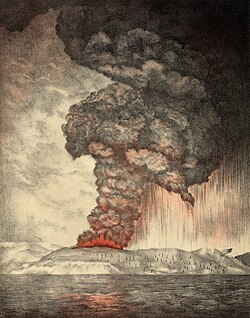Krakatoa / Hallelujah Chorus
Krakatoa
Written by John Curulewski, Paul Beaver, B. L. Krause
(Hallelujah Chorus written by Georg Friedrich Händel)
Lead Vocals by John Curulewski
Krakatoa you've changed your ways
from evil days.
Oh I know a once violent isle
and gentle smile.
When the dust and lava cooled
you were sterile as the rock from which the earth was tooled.
Was man's beginning a wind borne spore
to fly no more?
Nature's winning her docile spree
has set her free.
Seeds were wafted on the wind
forming heavy undergrowth for species winged and finned.
Tangled mangles rebuilt your soil
from age dead toil.
Sheltered bay coves protecting life
from Satan's knife.
Grow and island in the sun
where the hell fire belching earth had destructively left none.
Hallelujah Hallelujah Hallelujah Hallelujah Hallelujah
Hallelujah Hallelujah Hallelujah Hallelujah Hallelujah
For the Lord God omnipotent reigneth
Hallelujah Hallelujah Hallelujah Hallelujah
For the Lord God omnipotent reigneth
Hallelujah Hallelujah Hallelujah Hallelujah
King of kings and Lord of lords
King of kings and Lord of lords
And He shall reign forever and ever
Forever and ever
Hallelujah Hallelujah Hallelujah Hallelujah
Hallelujah
Interpretation
This poem beautifully invokes the terrible images appropriate to the eruption of the volcano Krakatau (also known as Krakatoa) near Java in Indonesia in 1883. The poem begins with the lines "Krakatoa you've changed your ways from evil days," drawing the listener in with a reminder that while Krakatoa is among the most infamous of volcanoes, the eruption happened a full 90 years earlier (the album was released in 1973). He further recognizes the past infamy of the volcanic eruption with the line "Oh I know a once violent isle and gentle smile," for while the island was once violent, during the destruction, its remnants are islands that form an arc like a smile, nestled peacefully in ocean.
Following the eruption, he says, "When the dust and lava cooled you were sterile as the rock from which the earth was tooled." It was a long time before the dust and lava cooled, and what remained was devoid of life. He asks the question of man's powerlessness to avoid the 36,400 deaths with the line "Was man's beginning a wind borne spore to fly no more?" (a line with a double meaning, for it likely also ties back to the Directed Panspermia theme of The Serpent Is Rising, which leads into this poem). And he further makes the point by saying, "Nature's winning her docile spree has set her free," indicating that this is nature's way of starting over. It soon becomes evident why, as the cycle of life continues, "Seeds were wafted on the wind forming heavy undergrowth for species winged and finned." The hard volcanic rock and loose volcanic ash are quickly (geologically speaking) ground into soil by the probing roots of the returning plant life as can be seen in the line "Tangled mangles rebuilt your soil from age dead toil."
The next line, "Sheltered bay coves protecting life from Satan's knife," can be interpreted in one of two ways. The term "Satan's knife" may be referring to the streams of hot magma, conjuring up images of a weapon thrust from the fires of Hell deep beneath the surface of the Earth. The bay coves may be "protecting life" by stopping the flow of the magma when it hits the cooling waters of the bay. It is also possible, however, to interpret the line to mean that the bay coves of the islands formed during the eruption as being constructed in such a way as to prevent predators, possibly including humans, from preying on the aquatic life taking refuge there. In this alternate interpretation, "Satan's knife" may be the predators, although imagery for the first interpretation is more compelling.
The poem ends with the lines, "Grow an island in the sun where the hell fire belching earth had destructively left none." This ending is very fitting because on August 27, 1883, concluding a three month chain of events that began with an earthquake on May 20, 1883, Krakatoa erupted with a force so great that it threw four cubic miles of earth into the atmosphere and instantly vanished as if devoured by the sea, causing formidable tidal waves which in turn swept off just about everything alive from the surrounding coastal areas. However, the disappearance of the gigantic Krakatoa also meant the birth of small islands in its place, one of which is called "Anak Krakatau" (or Krakatoa's Child) which is at present an extremely active young volcano. Thus, Anak Krakatau is the "island in the sun" which grows "where the hell fire belching earth had destructively left none."
The uplifiting religious lyrics and soaring organ music of the Hallelujah Chorus pose a striking contrast to the anti-creation Directed Panspermia theme of The Serpent Is Rising and the dark images and power-of-nature theme of the poem Krakatoa, for which this classical masterpiece is acting as a coda. The Hallelujah Chorus is perhaps the most recognizeable part of Handel's Messiah. The lyrics are based on the following verses from the Bible:
Hallelujah, for the Lord God Omnipotent reigneth, Hallelujah!
Revelation 19:6
The Kingdom of this world is become the Kingdom of our Lord, and of His Christ; and He shall reign for ever and ever, Hallelujah!
Revelation 11:15
King of Kings, and Lord of Lords, and He shall reign for ever and ever, Hallelujah!
Revelation 19:16


Comments
Post a Comment